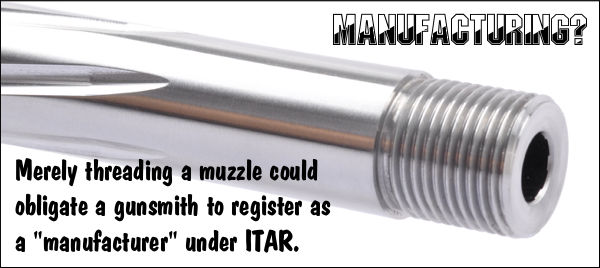ALERT: Feds Impose ITAR Registration Burdens on Gunsmiths

If you are a gunsmith or work on firearms, you need to read this carefully. The Federal Government, acting through the Department of State Directorate of Defense Trade Controls (DDTC), has imposed significant new burdens on gunsmiths by expanding the definition of “manufacturing”. This is a big deal, as the Arms Export Control Act (AECA) and its implementing rules, the International Traffic in Arms Regulations (ITAR), require firearms “manufacturers” to register with DDTC and to pay a registration fee that (for new applicants) is currently $2,250 per year.
READ DDTC’s ITAR Registration Requirements Concerning Gunsmithing Dated 7/22/2016
Official Title: ITAR Registration Requirements — Consolidated Guidance July 22, 2016 — Firearms Manufacturers and Gunsmiths
Previously, most small gunsmithing operations that did not export firearms were NOT subject to AECA/ITAR registration requirements. Now, by virtue of a DDTC “Guidance” ruling issued 7/22/2016, ordinary gunsmiths might be required to register as a manufacturer simply because they thread a muzzle or cut a chamber.
The NRA-ILA states: “DDTC is labeling commercial gunsmiths as ‘manufacturers’ for performing relatively simple work such as threading a barrel or fabricating a small custom part for an older firearm. Under the AECA, ‘manufacturers’ are required to register with DDTC at significant expense or risk onerous criminal penalties.” Read NRA-ILA Full Report.

Here is the key language in the DDTC’s “ITAR Registration Requirements – Consolidated Guidance” Ruling of 7/22/2016:
|
2. Registration Required – Manufacturing: In response to questions from persons engaged in the business of gunsmithing, DDTC has found in specific cases that ITAR registration is required because the following activities meet the ordinary, contemporary, common meaning of “manufacturing” and, therefore, constitute “manufacturing” for ITAR purposes: a) Use of any special tooling or equipment upgrading in order to improve the capability of assembled or repaired firearms; b) Modifications to a firearm that change round capacity; c) The production of firearm parts (including, but not limited to, barrels, stocks, cylinders, breech mechanisms, triggers, silencers, or suppressors); d) The systemized production of ammunition, including the automated loading or reloading of ammunition; e) The machining or cutting of firearms, e.g., threading of muzzles or muzzle brake installation requiring machining, that results in an enhanced capability; f) Rechambering firearms through machining, cutting, or drilling; g) Chambering, cutting, or threading barrel blanks; and h) Blueprinting firearms by machining the barrel. |
Editor’s Comment: Does this mean that any stock-maker or stock supplier is an ITAR “manufacturer” under part 2(c)? Would installing a scope or accessory rail fall under part 2(a) as “equipment upgrading”? Would fluting a barrel be considered “manufacturing” under part 2(h)?
Impact of New Registration Requirements
As the NRA-ILA (Institute for Legislative Action) reads this, gunsmithing shops (even one-man operations) will now be subject to ITAR regulation though they export nothing: “These requirements apply, even if the business does not, and does not intend to, export any defense article. Moreover, under ITAR, ‘only one occasion of manufacturing … a defense article’ is necessary for a commercial entity to be considered ‘engaged in the business’ and therefore subject to the regime’s requirements.”
As a consequence, these new regulations may drive smaller gunsmithing services out of business: “DDTC’s move appears aimed at expanding the regulatory sweep of the AECA/ITAR and culling many smaller commercial gunsmithing operations that do not have the means to pay the annual registration fee or the sophistication to negotiate DDTC’s confusing maze of bureaucracy. [This is] likely to have a significant chilling effect on activity that would not even be considered regulated.”
Barrel chambering image from Primal Rights, dealer for Desert Tactical Arms.Statutory Authority for Registration
The AECA’s statutory requirement for firearms manufacturers to register with DDTC is implemented in Part 122 of the ITAR:§122.1 Registration requirements.
(a) Any person who engages in the United States in the business of manufacturing or exporting or temporarily importing defense articles, or furnishing defense services, is required to register with the Directorate of Defense Trade Controls under §122.2. For the purpose of this subchapter, engaging in such a business requires only one occasion of manufacturing or exporting or temporarily importing a defense article or furnishing a defense service. A manufacturer who does not engage in exporting must nevertheless register.

















